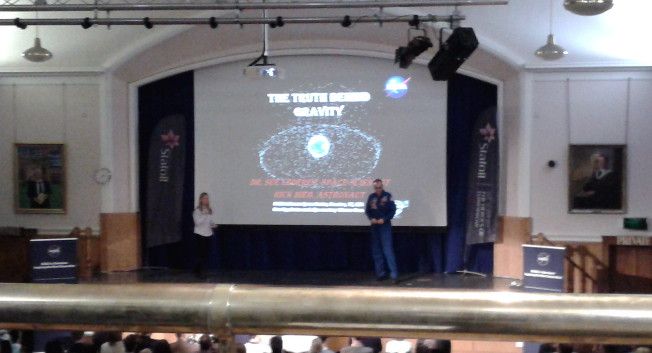Almost a year ago Dr Sue Lederer, a NASA space scientist, and Rick Hieb, a former NASA astronaut, came to beautiful Scotland to talk about working in space and bust some of the flaws in the movie ‘Gravity’.
I just stumbled across an old post of mine and thought I revisit some of the learnings in a sort of Q&A.
Oh, that reminds me ... I still haven't watched the movie.

Sorry for the crappy image quality. Blame my phone...
Is there gravity in space?
Yes. Anything with mass has gravity - the more mass, the more gravity.
How many orbits are there around Earth?
There are various orbits around Earth. We can find the ISS and Hubble in the low Earth orbit; GPS navigation equipment is in mid-Earth orbit.
Since the ISS is more or less just above our atmosphere, astronauts can see Earth's massive curvature, not that small ball that's sometimes depicted in the movies.
By the way, the further we get away from Earth, the slower the orbit. The ISS moves at ca. 8 km/s.
What's the big deal with space debris?
First of all, space debris is anything man-made that's no longer useful such as a broken satellite.
23,000 pieces of debris are being tracked by the US Department of Defence. If that sounds impressive, consider that a lab experiment of shattering a satellite produces 100,000 to 200,000 pieces! Each and every piece is a safety hazard because it can crash into space equipment or astronauts. Even just a paint chip can cause a tiny crater in a window, which may result in the window's failure. That's why ISS' windows are checked daily and swapped out if needed.
For a bit of relief... If something gets destroyed in one orbit, it usually remains there. Thus, other orbits are safe from neighbouring debris.
Also, items within the same orbit don't actually move as fast as movies have us believe. Their relative speed to each other is fairly slow. In contrast, items that cross orbits are so fast that you'd barely see them coming, never mind seek cover.
What is a Whipple shield?
That's basically a barrier made of two relatively thin sheets of metal (or other material). It is more protective than one thick sheet because a bullet or piece of debris shatters on impact with the first sheet. The second sheet is then only hit by slowed down fragments. It is used on the ISS and astronaut helmets.
Do astronauts really have fun floating about during a spacewalk?
No serious astronaut would jump around for fun or let go of the many tethers, which are there to secure them and the mobile equipment.
Can a hatch really pop open by accident?
Generally, the pressure is regulated to keep hatches closed. Thus, any sudden opening of an unlocked hatch is unlikely.
What is a space suit like?
A space suit weighs about 125-150 kg.
There are little mirrors on the wrists to enable astronauts to read all those little signs for controls on their suit. Hence, these are backwards!
Space underwear contains water tubes to cool the astronaut in the suit. There is also a drinking water supply connected to the helmet.
Astronauts wear nappies because there's no loo break during a spacewalk! An astronaut may spend up to 12 hours in the suit - 8 hours on the spacewalk, the rest getting the suit on and off etc.
Do astronauts just meet on the trip?
No. The teams train together for years. Situations where they just get to know each other through a bit of small talk like in some movies, don't exist.
What happens when somebody cries in space?
Check out this video and you'll see that Sandra Bullock's eye-watering scene in Gravity is impossible.
What kind of person can become an astronaut?
If you like hands-on work, you're off to a good start. You must enjoy fixing things. Being good at physics and other sciences is probably required. Interestingly, divers use a lot of the skills astronauts need.
Rick was telling us about his humble background as son of a lorry driver and a teacher. He found a lot of support in his community, including teachers, to push him to succeed in becoming an astronaut.

gif from here by @rocking-dave
If you take a microscope to moon rocks, they have a bunch of micro craters. Space is lit, you have super small debris flying around smashing into everything.
Crazy thing is all of this space debris is increasing all the time. So we have all this junk up there swinging around our earth.
Downvoting a post can decrease pending rewards and make it less visible. Common reasons:
Submit
Exactly, and nobody wants to pay to clean it up. Maybe we'll have our own rings some day. ;)
It makes you wonder though. If we're so keen on space travel for exploration and tourism, it is in the companies' and gov's interest to make it as safe as possible.
Downvoting a post can decrease pending rewards and make it less visible. Common reasons:
Submit